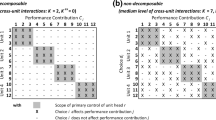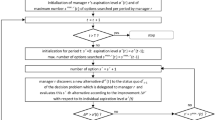Abstract
Prior research suggests that the fit between task complexity and incentive schemes like pay-for-performance positively affects organizational performance. This study goes a step further and seeks to investigate how different types of pay-for-performance affect subordinates’ search behavior for novel solutions to complex decision problems. Based on NK fitness landscapes, the study employs an agent-based simulation with subordinate decision-makers individually adapting their search behavior via reinforcement learning. The results suggest that the emerging search strategy is subtly shaped by the (mis-)fit between task complexity and incentive structure. In particular, the results indicate that search behavior may arise for different “reasons” ranging from fostering new solutions to even preventing alterations.
Access this chapter
Tax calculation will be finalised at checkout
Purchases are for personal use only
Similar content being viewed by others
Notes
- 1.
For example, in the “standard” hidden action model of principal-agent theory, both contracting parties know the entire space of possible effort levels which the agent could employ [10]. Hence, particular search processes to discover new options within the solution space are not required [11, with further references].
- 2.
Unit head r remembers the compensation resulting from the status quo \(\mathbf {d}^{r*}_{t-1}\), and, from this, can infer its actual performance \({P}^{r}_{t}\) if the status quo is kept.
- 3.
\(0\le p^r(s^a,t) \le 1\) and \(\sum _{s^a\in S} (p^r(s^a,t))=1\) apply to probabilities \(p^r(s^a,t)\).
- 4.
Pretests indicated that the results do not principally change for a longer observation period. The similar holds for longer learning intervals (e.g., \(T^L=20\)); however, shortening the learning period notably below ten periods does not leave the search strategies “enough time” to unfold their particular potential.
- 5.
The term “cluster” is employed to indicate a group of simulation runs which show a similar combination of units’ search strategies in the last observation period. The term is not used in terms of a cluster analysis.
- 6.
An extensive analysis including average number and performance of local peaks of numerous interaction structures based on the NK framework is provided in [22].
References
Lawrence, P.R., Lorsch, J.W.: Differentiation and integration in complex organizations. Admin. Sci. Q. 12(1), 1–47 (1967)
March, J.G.: Exploration and exploitation in organizational learning. Organ. Sci. 2(1), 71–87 (1991)
Bushman, R.M., Indjejikian, R.J., Smith, A.: Aggregate performance measures in business unit manager compensation: The role of intrafirm interdependencies. J. Account. Res. 33(Sup.), 101–129 (1995)
Siggelkow, N., Rivkin, J.W.: Speed and search: Designing organizations for turbulence and complexity. Organ. Sci. 16, 101–122 (2005)
Wall, F.: Learning to incentivize in different modes of coordination. Adv. Complex Syst. 20(2–3), 1–29 (2017)
Manso, G.: Motivating innovation. J. Financ. 66, 1823–1860 (2011)
Lerner, J., Wulf, J.: Innovation and incentives: evidence from corporate R&D. Rev. Econ. Stat. 89, 634–644 (2007)
Davila, A., Foster, G., Li, M.: Reasons for management control systems adoption: Insights from product development systems choice by early-stage entrepreneurial companies. Account. Org. Soc. 34, 322–347 (2009)
Chenhall, R.H.: Developing an organizational perspective to management accounting. J. Manag. Account. Res. 24, 65–76 (2012)
Holmström, B.: Moral hazard and observability. Bell J. Econ. 10, 74–91 (1979)
Leitner, S., Wall, F.: Decision-facilitating information in hidden-action setups: an agent-based approach. J. Econ. Interact. Coor. 16, 323–358 (2021)
Chen, S.-H.: Varieties of agents in agent-based computational economics: a historical and an interdisciplinary perspective. J. Econ. Dyn. Control 36, 1–25 (2012)
Kauffman, S.A., Levin, S.: Towards a general theory of adaptive walks on rugged landscapes. J. Theor. Biol. 128, 11–45 (1987)
Kauffman, S.A.: The Origins of Order: Self-Organization and Selection in Evolution. Oxford University Press, Oxford (1993)
Baumann, O., Schmidt, J., Stieglitz, N.: Effective search in rugged performance landscapes: a review and outlook. J. Manag. 45, 285–318 (2019)
Wall, F.: Agent-based modeling in managerial science: an illustrative survey and study. Rev. Manag. Sci. 10, 135–193 (2016)
Simon, H.A.: A behavioral model of rational choice. Q. J. Econ. 69, 99–118 (1955)
Simon, H.A.: Theories of decision-making in economics and behavioral science. Am. Econ. Rev. 49, 253–283 (1959)
Levitan, B., Kauffman, S.A.: Adaptive walks with noisy fitness measurements. Mol. Divers. 1, 53–68 (1995)
Brenner, T.: Agent learning representation: advice on modelling economic learning. In: Tesfatsion, L., Judd, K.L. (eds.) Handbook of Computational Economics, vol. 2, pp. 895–947. Elsevier, Amsterdam (2006)
Lorscheid, I., Heine, B.-O., Meyer, M.: Opening the ‘black box’ of simulations: increased transparency and effective communication through the systematic design of experiments. Comput. Math. Organ. Th. 18, 22–62 (2012)
Rivkin, J.W., Siggelkow, N.: Patterned interactions in complex systems: implications for exploration. Manag. Sci. 53, 1068–1085 (2007)
Redman, T.C.: The impact of poor data quality on the typical enterprise. Commun. ACM 41, 79–82 (1998)
Siggelkow, N., Rivkin, J.W.: When exploration backfires: unintended consequences of multilevel organizational search. Acad. Manag. J. 49, 779–795 (2006)
Author information
Authors and Affiliations
Corresponding author
Editor information
Editors and Affiliations
Rights and permissions
Copyright information
© 2022 The Author(s), under exclusive license to Springer Nature Switzerland AG
About this paper
Cite this paper
Wall, F. (2022). Pay-for-Performance and Emerging Search Behavior: When Exploration Serves to Reduce Alterations. In: Czupryna, M., Kamiński, B. (eds) Advances in Social Simulation. Springer Proceedings in Complexity. Springer, Cham. https://doi.org/10.1007/978-3-030-92843-8_9
Download citation
DOI: https://doi.org/10.1007/978-3-030-92843-8_9
Published:
Publisher Name: Springer, Cham
Print ISBN: 978-3-030-92842-1
Online ISBN: 978-3-030-92843-8
eBook Packages: Physics and AstronomyPhysics and Astronomy (R0)




